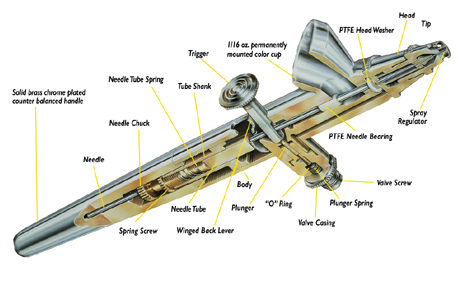

 |
 |

Before choosing an airbrush, consider the factors unique to your particular situation. What type of work will the airbrush be used for? What type of materials will be sprayed through the airbrush? What is your level of experience? etc? The list of terms, the cut-away airbrush diagram, and the reference chart will help you select the best airbrush for your intended application. But if you have questions, you can always call us at 1(800) AIR-BRUSH.
INTERNAL MIX indicates that air and paint mix inside the airbrush, producing a thoroughly atomized "fine dot" spray pattern.
EXTERNAL MIX indicates that air and paint mix outside the airbrush producing a larger, coarser spray pattern than internal mix airbrushes.
DUAL ACTION refers to airbrushes on which the trigger controls both air and color (down for air, back for color). This style airbrush allows for varying line widths while spraying.
SINGLE ACTION refers to airbrushes on which the trigger controls only the air flow. The amount of fluid is regulated by turning the needle adjustment screw. When the trigger is depressed, a pre-set amount of fluid is sprayed.
GRAVITY FEED refers to airbrushes with top-mounted color cups in which gravity draws paint into the airbrush. Less air pressure (as low as 8-16 PSI) is required to operate this type of airbrush.
BOTTOM FEED refers to airbrushes on which paint enters through a siphon tube or color cup attached to the bottom of the airbrush. This type of airbrush requires at least 20-30 PSI to operate properly.
SIDE FEED refers to airbrushes on which a small color cup fits into the side of the airbrush. This type of airbrush requires at least 20 PSI to operate.
Airbrushes are available in varying needle/nozzle configurations accommodating a range of sprayable materials.
Fine: Best suited to spray thinner materials such as water colors, inks, dyes, food coloring and gouache.
Medium: The most popular choice; will spray airbrush ready paints, such as Badger's Air-Opaque, Air-Tex, Modelflex, Freakflex, Nail Flair, Spectra-Tex, and other properly reduced acrylics.
Heavy: Ideal for heavily pigmented and/or higher viscosity materials such as enamels, lacquers, reduced glazes, gesso, and varnish.
Determining what size needle or spray regulator you have. Badger marks the needles and spray regulators as follows:
Needles (Blunt End):
Fine-No lines or one line
Medium-Two lines
Heavy-Three lines
Spray Regulator:
Fine-Stamped with XF or F
Medium-Stamped with IL or Blank
Heavy-Stamped with HD or L
Note: When reducing mediums to sprayable viscosity, the recommended consistency is comparable to 2% milk.